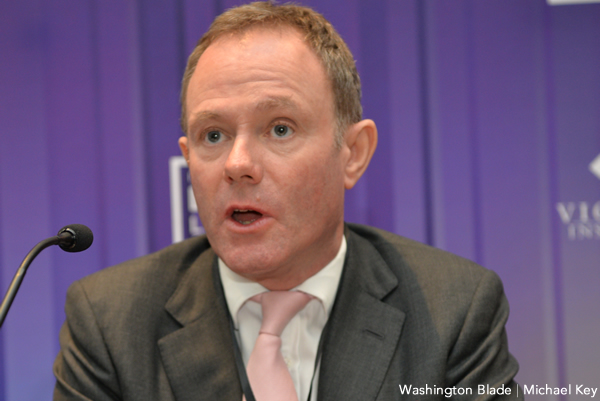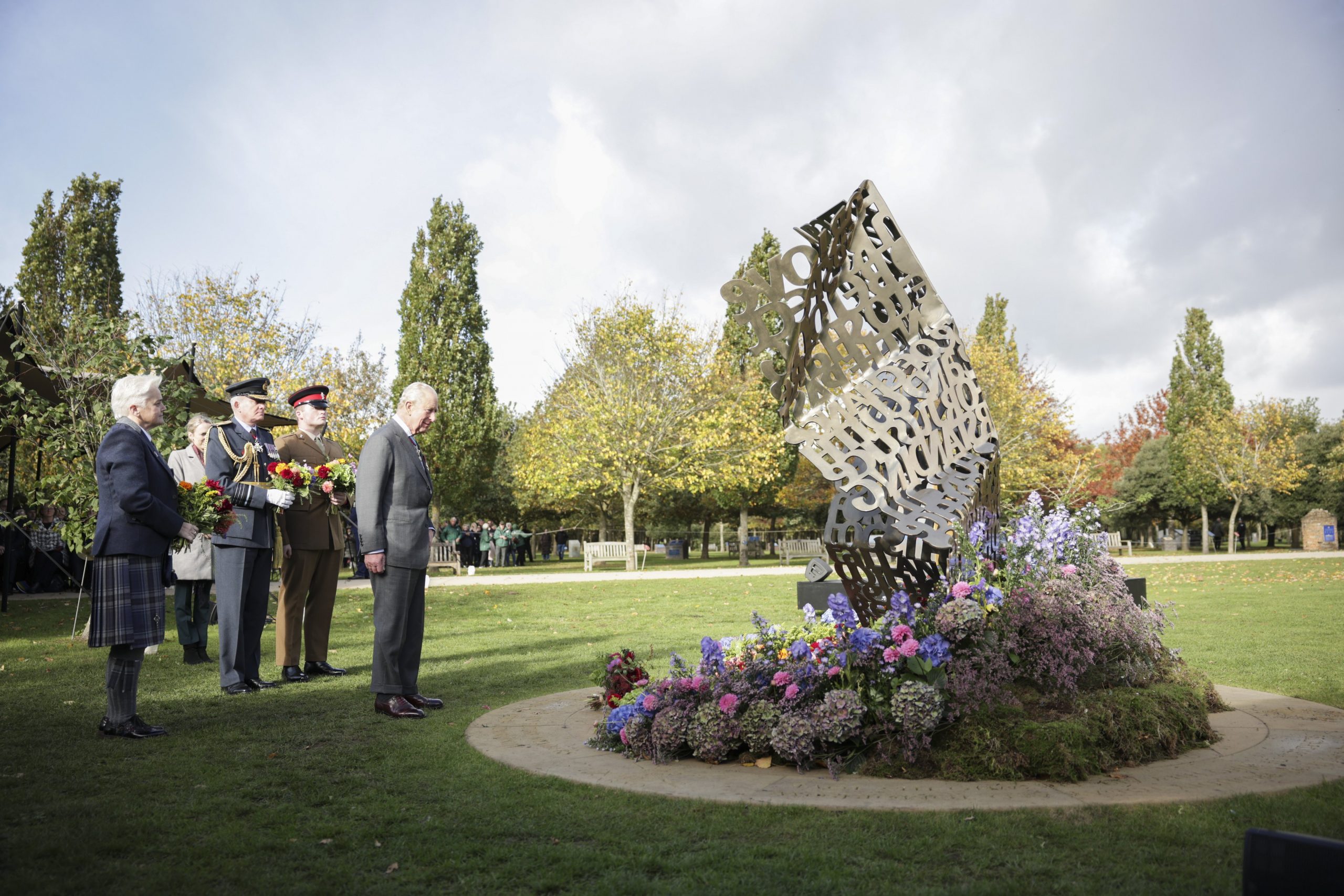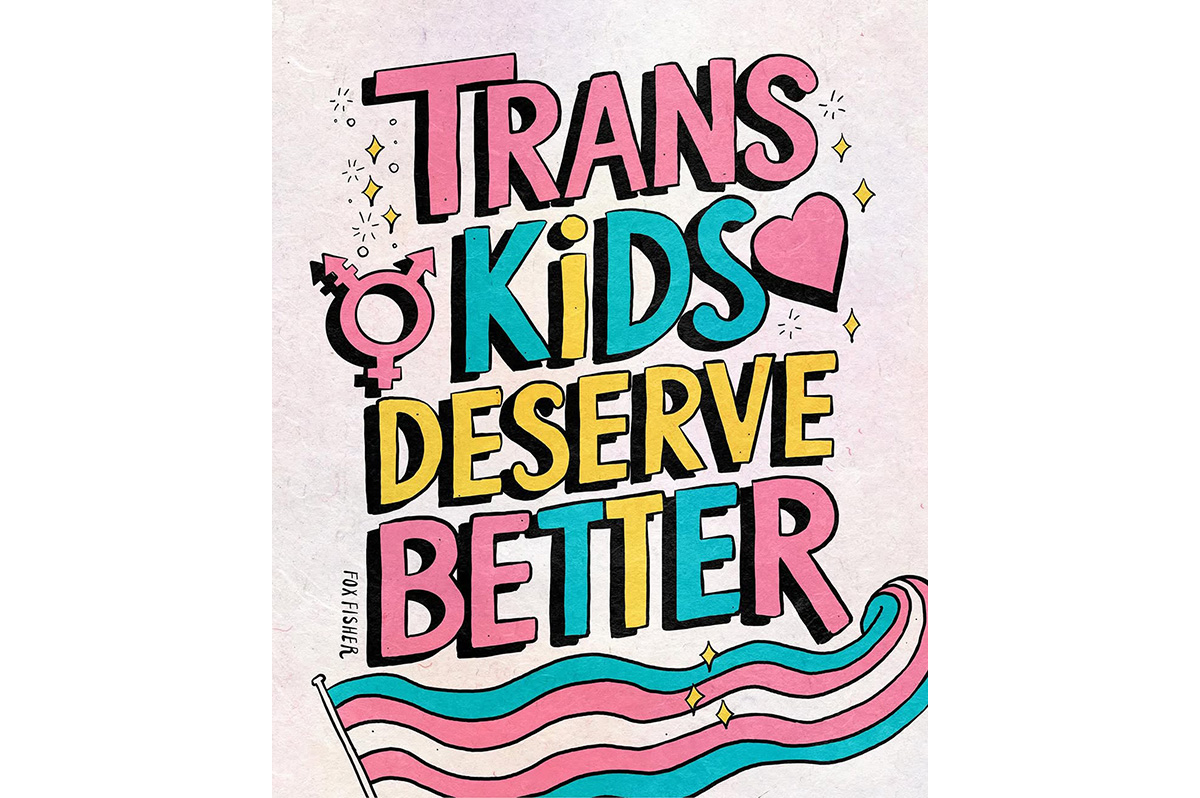United Kingdom
Boris Johnson’s LGBTQ rights advisor criticizes advocacy groups over conference cancellation
Nick Herbert acknowledges episode damaged UK ‘global reputation’

British Prime Minister Boris Johnson’s advisor on LGBTQ issues on Sunday issued a lengthy statement in response to the boycott of the government’s Safe to Be Me Conference that prompted its cancellation.
Nick Herbert, a member of the British House of Lords, in his statement described the conference’s cancellation as “damaging to the government and to the U.K.’s global reputation.” Herbert added it is “also an act of self-harm by the LGBT lobby.”
The conference was to have taken place in London from June 29-July 1.
The British government cancelled it last week after more than 100 British LGBTQ rights groups announced they would boycott it in response to Johnson’s decision to exclude transgender people from a conversion therapy ban. LGBT Business Champion Iain Anderson on Tuesday resigned over the issue.
Here is Herbert’s entire statement.
The Safe To Be Me equality conference was to be a global first, bringing governments, businesses, parliamentarians, faith leaders and activists together to discuss how to advance LGBT rights across the world. Our focus was on ending violence, advancing decriminalization in the 71 jurisdictions where homosexual conduct is still a crime, ensuring access to HIV/AIDS treatments, and building the economic case for inclusion.
We had remarkable speakers lined up and exciting plans for a new public-private fund to support LGBT groups in countries where they need our help. There was enthusiasm from governments and organizations planning to attend, often indicating they would bring new announcements or commitments to progress LGBT rights. We aimed to drive real action globally, and one major government had already indicated that they would hold a successor event to take agreed initiatives forward.
The conference’s cancellation is damaging to the government and to the U.K.’s global reputation. But it is also an act of self-harm by the LGBT lobby. Having orchestrated the boycott which brought the event down, Stonewall now claims to be “truly sad that the government does not feel in a position to run the UK’s first global LGBT+ conference,” adding that this shows a lack of concern for equal rights. Crocodile tears will be of little consolation to brave human rights defenders in countries where the right to wave a rainbow flag without being arrested is a distant dream.
LGBT groups were understandably dismayed, as was I, when a promised conversion therapy ban was suddenly dropped and then only partially reinstated just hours later. The bill will no longer extend to trans people, reflecting concern that more time is needed to ensure that legitimate therapies to help young people with gender dysphoria are not inadvertently criminalized. I believe such concerns can be allayed. Helping people come to terms with who they are is not the same as setting out to take them in one direction or the other — that is not therapy, it is ideology, and it can do irreparable harm.
It is quite possible that Parliament will decide to include trans people in the new law, as many other countries have done, for instance in Canada, where Conservative MPs unanimously supported the fast-tracking of a ban. But we must address the concerns and make the case for change, deploying the evidence and reassuring parliamentarians that a ban which include trans people is a safe and justifiable course to take.
Some of those who have raised their voices in Parliament about trans rights are reactionaries who opposed reforms such as equal marriage. But others are not. They are decent, middle-of-the-road politicians who supported gay rights but have genuine concerns that gender ideology may have gone too far, and that women’s rights and children must be protected.
Opinion research tells us that the public is sympathetic to trans people, and wishes to be kind, but has concerns about certain issues such as the safety of women in single sex spaces and especially the fairness of trans women competing in elite women’s sports. Our laws already allow for sensible balances to be struck to meet these concerns: Exemptions to the Equality Act allow single sex spaces to be protected, trans women prisoners to be placed in special wings, and sports bodies to set rules which may exclude trans competitors. Calm explanation of the facts and discussion on the right boundaries of these compromises is needed.
But social media, the rise of identity politics and the bitter polarization of every issue does not lend itself to rational discussion. When the prime minister expresses concerns, in reasonable terms, about issues such as fairness in sport, he is not being “transphobic”, as Stonewall immediately branded him. Nor is he alone, and growing disquiet across the political spectrum cannot sensibly be swept aside.
In the days when it was winning, the LGBT lobby made a compelling case for change, engaging successive governments and briefing parliamentarians. Now it is organizing boycotts and shouty protests. A fortnight ago in Manchester, a protester held up a trans flag with the words “some women have penises.” It is hard to imagine a surer way to lose a public argument. For days afterwards, politicians struggled to say whether they agreed, or could define what a woman is. A sensitive, complex debate is being reduced to ugly, dehumanizing talk about body parts.
Some may tell the government that this is a political opportunity for a wedge issue, but this would be deeply unwise. It is one thing to make an issue of statue-toppling and historical revisionism, another to appear to be attacking minorities and vulnerable people. It is also a misreading of public opinion. People want to hear solutions: they don’t see these issues through an ideological lens.
We must not allow a descent into a political mire which is dominated by extremes and which suffocates the reasonable middle ground. Across the Atlantic, this debate has become toxic, with hideous and persecutory anti-trans laws being passed by state legislatures. That is not who we are. We have to find a way to take the heat out of this debate.
I believe we now need a Royal Commission to examine these issues dispassionately. Its members would have to be truly neutral for such an inquiry to work: It could be led by a senior judge. It would need to be set up with cross-party support and without predetermination of its direction or outcome. Weighing the evidence on contested areas such as sport, safe spaces for women, and gender identity services for children and young people — building on the work of the independent Cass review — would be a better way to detoxify the debate, protect trans people from being caught in the political crossfire, and find the common ground we need.
No one will win from a culture war on these issues, and those most harmed will be trans people who already feel stigmatized, people who are different yet just like us, human beings who deserve greater kindness than today’s politics will permit.
United Kingdom
King Charles III unveils memorial to British LGBTQ servicemembers
Ceremony is first time monarch held ‘official engagement’ in support of community.

King Charles III on Monday unveiled a memorial to British LGBTQ servicemembers.
The memorial is located at the National Memorial Arboretum in Burton-on-Trent, England.
“We see all the LGBT+ serving members and veterans of the Armed Forces, and we salute you,” said the Royal Family in a social media post that contained a video of Charles placing flowers at the memorial.
“Throughout the 20th century, gay men, lesbians, and bisexual people were banned from serving in the UK Armed Forces,” it adds.
We see all the LGBT+ serving members and veterans of the Armed Forces, and we salute you. 🌈
This afternoon at the National Memorial Arboretum, The King attended the Dedication Ceremony of a new memorial in recognition of all LGBT+ people who have served and continue to serve… pic.twitter.com/tEbkzsQHTG
— The Royal Family (@RoyalFamily) October 27, 2025
“Today marks a historic step for healing and reconciliation,” said the British Defense Ministry.
The BBC notes gay servicemembers could not serve openly in the UK until 2000.
Monday’s ceremony is the first time Charles held an “official engagement” in support of LGBTQ rights.
His mother, Queen Elizabeth II, gave royal assent to the Sexual Offenses Act of 1967, which decriminalized consensual same-sex sexual relations among men in England and Wales who are at least 21, and to a law that extended marriage rights to same-sex couples in England and Wales in 2014. Elizabeth, among other things, also pardoned Alan Turing, an acclaimed World War II codebreaker and computer scientist who died by suicide two years after his 1952 conviction for “gross indecency.”
Then-Prime Minister Rishi Sunak in 2023 apologized to LGBTQ servicemembers who “endured the most horrific sexual abuse and violence, homophobic bullying, and harassment, all while bravely serving this country.”
United Kingdom
LGBTQ Brits fight back against the far-right
Tommy Robinson led Sept. 13 rally in London

When far-right politics became more and more influential across Europe, fueled by American attempts to spread anti-LGBTQ bigotry in the Western world, LGBTQ people in the UK have begun to furiously fight back.
Let me be clear: when I first came to the UK as a queer asylum seeker in 2018, it was one of the most LGBTQ-friendly countries I had ever seen. But recently, things have changed. The politics toward refugees and trans people have become much harsher.
On Sept. 13, nearly 150,000 people joined a rally led by far-right influencer Tommy Robinson, which left dozens of police officers injured. American billionaire Elon Musk addressed protesters on Whitehall via video link, urging British people to start a revolution against being “too woke.” This protest and this speech are still widely discussed on British TV and social media, or, more precisely, not the news itself but the fear of a far-right turn and the bigoted influence from another side of the ocean it created.
Many local LGBTQ groups, like Worcester LGBT, one of the biggest LGBTQ groups in Worcester, made a statement against these events to a local newspaper:
“These movements often promote anti-immigration, anti-Muslim, and anti-LGBTQ+ views that threaten the safety, dignity, and human rights of many of the people we support. As a network that supports LGBTQ+ asylum seekers and refugees, WLGBT stands firmly against all forms of hate, racism, xenophobia, and Islamophobia. We know from experience that far-right rhetoric can directly fuel harassment, discrimination, and violence — especially for people at the intersection of multiple vulnerabilities.”
And then, there were more reasons to be concerned.
On Sept. 17, when President Donald Trump and his wife Melania visited the UK, many queer people in the UK decided they had had enough. Queer groups circulated information about anti-Trump protests and issued statements.
Trans Kids Deserve Better, a British group for transgender rights led by trans youth, told the Washington Blade:
“Donald Trump is a fascist. He rolled back laws protecting trans rights for both children and adults in America, causing irreversible damage to the trans community. These protections were flawed, but they still mattered. The rollback and rhetoric from Trump are especially harmful for trans youth.
Trump being given a state visit to the UK by Keir Starmer really shows his morally reprehensible stance on trans rights and human rights. While we at Trans Kids Deserve Better have not directly organized anti-Trump protests, we have reposted callouts to walk out of school (organized by Socialist Students) as well as a march organized by UK Stop Trump.
Some people like to pretend that the far right and their anti-immigrant rhetoric have no impact on trans people. Some of these people are actually trans themselves, going along with hate to seem more ‘presentable,’ such as Blaire White and Caitlyn Jenner. At Tommy Robinson’s most recent Unite The Kingdom rally, Elon Musk came on to speak. Musk has made it his mission to destroy the so-called ‘woke mind virus’ and has platformed transphobic organisations such as Gays Against Groomers, who claim all trans people are just confused gay people. By allowing these transphobes to spread their hate, Tommy Robinson is complicit in the hatred against us all.”
Hundreds counterprotested Robinson’s latest rally and thousands protested Trump’s visit, including many LGBTQ people, as the protests were widely promoted by local LGBTQ groups. Stand Up To Racism, which organizing counter-protesters against Robinson and also called the anti-Trump demonstration, has always supported LGBTQ rights and counts many LGBTQ people among its supporters, wich I could say for sure by my own experience with the group.
LGBTQ organizations supporting LGBTQ refugees are especially worried about the rising far-right influence.
Leila Zadeh, executive director of Rainbow Migration, which supports LGBTQ people navigating the UK’s asylum and immigration system, told the Blade:
“The far-right protest left us, and the LGBTQI+ people we support to settle safely in the UK, heartbroken. Hate on this scale drives discrimination and abuse toward people of color, Muslims, immigrants, refugees, and trans individuals across the country. It has been fuelled for years by successive governments and sections of the media to distract from the real problems people face: struggling to buy food, heat their homes, or get a dentist appointment. Instead of scapegoating marginalised groups, we need to come together and demand an end to the divisive rhetoric and cruel policies that dehumanise people and put lives at risk. Most people in the UK welcome refugees, and 80 percent of the British public want an asylum system that is fair and compassionate.”
This rhetoric is not just talked about among LGBTQ pro-immigrants groups.
British screenwriter Russell T Davies, writer of “Queer as Folk” and some of the episodes of legendary sci-fi show “Doctor Who,” has blamed Trump and the British far-right Reform Party, which is also radically anti-refugee, for spreading anti-LGBTQ propaganda, echoing the sentiments of grassroots LGBTQ initiatives.
And maybe this is the one positive outcome of the far-right’s rise; as controversial as it sounds. They reminded the LGBTQ community that the fight for equality is about more than just Prides and drag queen shows. They pushed much of the British LGBTQ community to unite against bigotry in order to prevent a repeat of what happened in the U.S.
It also encouraged mainstream LGBTQ groups, made up mostly of people born in the UK, to stand more mindfully with their LGBTQ refugee siblings, and with refugees, asylum seekers, Muslims, and ethnic minorities in general. At the same time, it made some refugee groups more mindful of LGBTQ rights.
By attacking different minorities, the far right is unintentionally creating unlikely alliances that can deepen people’s understanding of justice and solidarity. It also made British LGBTQ people closer to the American LGBTQ community in their common fight and support toward each other. In the end, this could help make the world a better place. Because everything is connected.

Politicians and the media have recently taken to speaking about trans kids; how to “protect” children who think they are trans.
The problem with such conversations is that the voices of transgender children and teenagers are ignored. Their existence is erased and even denied. Too often, transgender minors are discriminated against in the name of their own “protection.” And only a few have the resources or opportunities to speak up.
But not in the UK.
Despite Britain’s reputation for exporting transphobic ideas around the globe — fueled in part by a vocal trans-exclusionary radical feminist movement, most visibly represented by J.K. Rowling) — the country has one of the most prominent youth-led initiatives there, Trans Kids Deserve Better.
The Washington Blade spoke with their representative, Ashes, to learn more about them, and maybe even learn something from them. After all, the fight for trans rights is global for Trans Kids Deserve Better.
BLADE: Tell us a little bit about the group history.
“Trans Kids Deserve Better (TKDB) was founded in June 2024 by two trans kids after they were driven to action by what they read in the news,” said Ashes, referring to the situation when the British National Health Service started to deny hormone therapy for transgender minors, and conservative transphobic voices became much more prominent in the media. “Our first action was a banner drop on NHS England, which then turned into a four-day occupation as more and more people joined in. What started as a small action group between friends attracted many other trans kids, and eventually, TKDB became a full-scale action network made up of dozens of children throughout the country.”
BLADE: What, in the group’s opinion, is the main problem trans minors face today in the UK?
ASHES: The biggest problems trans kids face in the UK stem from how we are constantly ignored and scapegoated in both politics and everyday life. For example, our British Health Secretary Wes Streeting ignored trans children for whom puberty blockers were life-saving medical care, and instead just banned the usage of puberty blockers for trans kids. Far too often, people pretend we don’t exist. Or they will use trans people — especially in politics — as a means of deflection. Or we are painted as a threat. Both lead to alienation, which creates spaces where trans people can be mocked, harassed, ostracised, not taken seriously, and denied their universal rights. We see this happening everywhere, from school spaces to the government. It is terrifying being villainized and ignored by the very people who are supposed to keep you safe, and it fosters an environment that can be incredibly dangerous to the physical and mental health of trans kids.
BLADE: Tell us a little bit about your most important protests and campaigns. Are they connected? What do you do to reach your goals?
ASHES: Well, most of our actions are separate from each other, but we do also have some continuous campaigns. For example, our campaign Kids Are Dying, Wes (KADW) has been ongoing for over a year and aims to draw attention to and call out Health Secretary Wes Streeting for his role in the puberty blocker ban. We were placing paper coffins outside Wes Streeting’s office to represent the deaths of the trans children caused by his actions. We ended this daily protest just recently, after a full year of no comment from Wes — although he can’t fully pretend we don’t exist, because he blocked our page and KADW on social media. But there’s still more to come from KADW! We are also always coming up with new action ideas.
BLADE: Why do you think it is important for LGBTQ adults to listen to trans kids?
ASHES: Because even LGBT+ adults, who have their own experiences and contribute a lot to activism, will not have the experience of being a trans kid in this exact day and age. Because we’re teens, trans, and have first-hand experience, we have a unique perspective on modern-day education, healthcare, politics, and social media, especially when those topics concern us. When advocating for trans kids, it’s important to include actual kids in these conversations; nobody knows better what trans children need than those trans children themselves.
BLADE: And what about the international meaning of social movements such as Trans Kids Deserve Better? Why can such European campaigns be important for Americans?
ASHES: Recently, Nigel Farage, the leader of the Reform UK party [a far-right political party that has gained more and more influence in the UK] and a blatant transphobe, has said he wants to “Make Britain Great Again,” naming Donald Trump as one of the inspirations for his politics. This is a key example of how British and American politics especially are very interlinked — and so are the rights of minorities across these countries and beyond. Because while wanting rights for trans people and other minorities should not be deemed political, it is. Transphobic rulings passed in one country can inspire the leader of another country to do something similar. Prominent figures in Britain, especially local trans-exclusionary radical feminists, are influential throughout the world — particularly J.K. Rowling, who actively uses her money to campaign against trans rights. But more positively, thanks to social media and the news, trans activism can inspire people from completely different countries to come up with their own actions, or even just give them hope and encourage them to get through the day. We are all fighting the same fight.
-

 New York4 days ago
New York4 days agoPride flag removed from Stonewall Monument as Trump targets LGBTQ landmarks
-

 Italy5 days ago
Italy5 days agoOlympics Pride House ‘really important for the community’
-

 Florida4 days ago
Florida4 days agoDisney’s Gay Days ‘has not been canceled’ despite political challenges
-

 District of Columbia4 days ago
District of Columbia4 days agoCapital Pride wins anti-stalking order against local activist




















